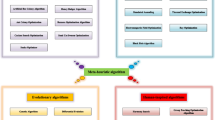Abstract
This paper describes quasi-reflected ions motion optimization algorithm to solve the short-term hydrothermal scheduling problem. The aim of hydrothermal scheduling is to minimize the total cost of generation by optimizing power generation of several hydro and thermal units on an hourly basis. The algorithm mainly works on the principle that opposite charges attract each other and same charges repel each other. Two phases are employed in this algorithm, namely liquid phase and crystal phase, in order to perform exploration and exploitation. Furthermore, quasi-reflected-based learning scheme is incorporated to ions motion optimization algorithm, in order to increase the convergence speed as well as the quality of the solution. To investigate the performance of the ions motion optimization algorithm, the algorithm has been tested on seven test systems. The results obtained by the ions motion optimization algorithm have been compared with those obtained by many recently developed optimization techniques such as evolutionary programming, genetic algorithm, particle swarm optimization, differential evolution, artificial immune system, teaching–learning-based optimization, real-coded chemical-reaction-based optimization, cuckoo search algorithm and modified cuckoo search algorithm. Moreover, some statistical tests have been performed to evaluate the performance of ions motion optimization algorithm.










Similar content being viewed by others
References
Engles L, Larson RE, Peschon J, Stanton KN (1976) Dynamic programming applied to hydro and thermal generation scheduling. In: IEEE tutorial course text, 76CH1107-2-PWR, IEEE, New York
Saha TN, Khaparde SA (1978) An application of a direct method to the optimal scheduling of hydrothermal systems. IEEE Trans PAS 97(3):977–983. doi:10.1109/TPAS.1978.354571
Wood AJ, Wollenberg BF (1984) Power generation, operation and control. Wiley, New York
Brannud H, Bubenko JA, Sjelvgren D (1986) Optimal short term operation planning of a large hydrothermal power system based on a nonlinear network flow concept. IEEE Trans PWRS 1(4):75–82. doi:10.1109/TPWRS.1986.4335019
Xia Q, Xiang N, Wang S, Zhang B, Huang M (1988) Optimal daily scheduling of cascaded plants using a new algorithm of non-linear minimum cost network flow concept. IEEE Trans PWRS 3(3):929–935. doi:10.1109/59.14543
Piekutowski MR, Litwinowicz T, Frowd RJ (1993) Optimal short term scheduling for a large scale cascaded hydro system. In: Power industry computer applications conference, Phoenix, pp 292–298. doi:10.1109/59.317636
Zaghlool MF, Trutt FC (1988). Efficient methods for optimal scheduling of fixed head hydrothermal power systems. IEEE Trans Power Syst 3(1). doi:10.1109/59.43176
Salam Nor KM, Hamdan AR (1998) Hydrothermal scheduling based Lagrangian relaxation approach to hydrothermal coordination. IEEE Trans Power Syst 13(1):226–235. doi:10.1109/59.651640
Rashid AHA, Nor KM (1991) An efficient method for optimal scheduling of fixed head hydro and thermal plants. IEEE Trans Power Syst 6(2):632–636. doi:10.1109/59.76706
Nilsson O, Sjelvgren D (1996) Mixed-integer programming applied to short-term planning of a hydrothermal system. IEEE Trans Power Syst 11(1):281–286. doi:10.1109/59.486107
Wong KP, Wong YW (1994) Short-term hydrothermal scheduling Part I: simulated annealing approach. Proc Inst Electr Eng Gen Transm Distrib 141(5):497–501. doi:10.1049/ip-gtd:19941350
Wong KP, Wong YW (1994) Short-term hydrothermal scheduling Part II: parallel simulated annealing approach. Proc Inst Electr Eng Gen Transm Distrib 141(5):502–506. doi:10.1049/ip-gtd:19941351
Chan PH, Chang HC (1996) Genetic aided scheduling of hydraulically coupled plants in hydrothermal coordination. IEEE Trans Power Syst 11(2):975–981. doi:10.1109/59.496183
Orero SO, Irving MR (1998) A genetic algorithm modeling framework and solution technique for short term optimal hydrothermal scheduling. IEEE Trans PWRS 13(2):501–518. doi:10.1109/TPWRS.2002.807053
Gil E, Bustos J, Rudnick H (2003) Short-term hydrothermal generation scheduling model using a genetic algorithm. IEEE Trans PWRS 18(4):1256–1264. doi:10.1109/TPWRS.2003.819877
Zoumas CE, Bakirtzis AG, Theocharis JB, Petridis V (2004) A genetic algorithm solution approach to the hydrothermal coordination problem. IEEE Trans Power Syst 19(3):1356–1364. doi:10.1109/TPWRS.2004.825896
Hota PK, Chakrabarti R, Chattopadhyay PK (1999) Short-term hydrothermal scheduling through evolutionary programming technique. Electr Power Syst Res 52:189–196. doi:10.1016/S0378-7796(99)00021-8
Sinha N, Chakrabarti R, Chattopadhaya PK (2003) Fast evolutionary programming techniques for short-term hydrothermal scheduling. Electric Power Syst Res 66:97–103. doi:10.1109/TPWRS.2002.807053
Türkay B, Mecitoğlu F, Baran S (2011) Application of a fast evolutionary algorithm to short-term hydrothermal generation scheduling. Energy Sourc Part B Econ Plan Policy 395–405. doi:10.1080/15567249.2010.489098
Basu M (2003) Hopfield neural networks for optimal scheduling of fixed head hydrothermal power systems. Electr Power Syst Res 64(1):11–15. doi:10.1016/S0378-7796(02)00118-9
Mandal KK, Chakraborty N (2008) Differential evolution technique-based short-term economic generation scheduling of hydrothermal systems. Electr Power Syst Res 78(11):1972–1979. doi:10.1016/j.epsr.2008.04.006
Zhang J, Lin S, Qiu W (2015) A modified chaotic differential evolution algorithm for short-term optimal hydrothermal scheduling. Int J Electr Power Energy Syst 65:159–168. doi:10.1016/j.ijepes.2014.09.041
Sasikala J, Ramaswamy M (2010) Optimal gamma based fixed head hydrothermal scheduling using genetic algorithm. Expert Syst Appl 37(4):3352–3357. doi:10.1016/j.eswa.2009.10.015
Wang Y, Zhou J, Mo L, Zhang R, Zhang Y (2012) Short-term hydrothermal generation scheduling using differential real-coded quantum-inspired evolutionary algorithm. Energy 44(1):657–671. doi:10.1016/j.energy.2012.05.026
Wang Y, Zhou J, Mo L, Ouyang S, Zhang Y (2012) A clonal real-coded quantum-inspired evolutionary algorithm with Cauchy mutation for short-term hydrothermal generation scheduling. Int J Electr Power Energy Syst 43(1):1228–1240. doi:10.1016/j.ijepes.2012.06.036
Yu B, Yuan X, Wang J (2007) Short-term hydro-thermal scheduling using particle swarm optimization method. Energy Convers Manage 48(7): 1902–1908. doi:10.1016/j.enconman.2007.01.034
Mandal KK, Basu M, Chakraborty N (2008) Particle swarm optimization technique based short-term hydrothermal scheduling. Appl Soft Comput 8(4):1392–1399. doi:10.1016/j.asoc.2007.10.006
Hota PK, Barisal AK, Chakrabarti R (2009) An improved PSO technique for short-term optimal hydrothermal scheduling. Electr Power Syst Res 79(7):1047–1053. doi:10.1016/j.epsr.2009.01.001
Amjady N, Soleymanpour HR (2010) Daily hydrothermal generation scheduling by a new modified adaptive particle swarm optimization technique. Electr Power Syst Res 80(6):723–732. doi:10.1016/j.epsr.2009.11.004
Zhang J, Wang J, Yue C (2012) Small population-based particle swarm optimization for short-term hydrothermal scheduling. IEEE Trans Power Syst 27(1):142–152. doi:10.1109/TPWRS.2011.2165089
Rasoulzadeh-Akhijahani A, Mohammadi-Ivatloo B (2015) Short-term hydrothermal generation scheduling by modified dynamic neighborhood learning based particle swarm optimization. Int J Elec Power Energy Syst 67:350–367. doi:10.1016/j.ijepes.2014.12.011
Fakhar MS, Kahif SAR, Saqib MA, Hassan TU (2015) Non cascaded short-term hydro-thermal scheduling using fully-informed particle swarm optimization. Int J Electr Power Energy Syst 73:983–990. doi:10.1016/j.ijepes.2015.06.030
Basu M (2011) Artificial immune system for fixed head hydrothermal power system. Energy 36(1):606–612. doi:10.1016/j.energy.2010.09.057
Roy PK (2013) Teaching learning based optimization for short-term hydrothermal scheduling problem considering valve point effect and prohibited discharge constraint. Int J Elec Power 53:10–19. doi:10.1016/j.ijepes.2013.03.024
Roy PK, Paul C, Sultana S (2014) Oppositional teaching learning based optimization approach for combined heat and power dispatch. Int J Elec Power 57:392–403. doi:10.1016/j.ijepes.2013.12.006
Bhattacharjee K, Bhattacharya A, Nee Dey SH (2014) Real coded chemical reaction based optimization for short-term hydrothermal scheduling. Appl Soft Comput 24:962–976. doi:10.1016/j.asoc.2014.08.048
Bhattacharjee K, Bhattacharya A, Nee Dey SH (2014) Oppositional real coded chemical reaction based optimization to solve short-term hydrothermal scheduling problems. Int J Elec Power 63:145–157. doi:10.1016/j.ijepes.2014.05.065
Fang N, Zhou J, Zhang R, Liu Y, Zhang Y (2014) A hybrid of real coded genetic algorithm and artificial fish swarm algorithm for short-term optimal hydrothermal scheduling. Int J Elec Power 62:617–629. doi:10.1016/j.ijepes.2014.05.017
Nguyen TT, Vo DN, Ruong AV (2014) Cuckoo search algorithm for short-term hydrothermal scheduling. Appl Energy 132:276–287. doi:10.1016/j.apenergy.2014.07.017
Nguyen TT, Vo DN (2015) Modified cuckoo search algorithm for short-term hydrothermal scheduling. Electr Power Energy Syst 5:271–281. doi:10.1016/j.ijepes.2014.10.004
Ahmadi A, Kaymanesh A, Siano P, Janghorbani M, Nezhad AE, Sarno D (2015) Evaluating the effectiveness of normal boundary intersection method for short-term environmental/economic hydrothermal self-scheduling. Electr Power Syst Res 123:192–204. doi:10.1016/j.epsr.2015.02.007
Gouthamkumar N, Sharma V, Naresh R (2015) Disruption based gravitational search algorithm for short term hydrothermal scheduling. Expert Syst Appl 42:7000–7011. doi:10.1016/j.eswa.2015.05.017
Javidy B, Hatamlou A, Mirjalili S (2015) Ions motion algorithm for solving optimization problems. Appl Soft Comput 32:72–79. doi:10.1016/j.asoc.2015.03.035
Tizhoosh H (2005) Opposition-based learning: a new scheme for machine intelligence. In: Proceedings of the international conference on computational intelligence for modeling control and automation, Austria, pp 695–701. doi:10.1109/CIMCA.2005.1631345
Rahnamayan S, Tizhoosh HR, Salama MMA (2007). Quasi oppositional differential evolution. In: Proceeding of IEEE congress on evolution computing. CEC, pp 2229–2236. doi:10.1109/CEC.2007.4424748
Roy PK, Mandal D (2011) Quasi-oppositional biogeography-based optimization for multi-objective optimal power flow. Electr Power Compon Syst 40(2):236–256. doi:10.1080/15325008.2011.629337
Wang H, Wu ZJ, Rahnamayan S, Liu Y, Ventresca M (2011) Enhancing particle swarm optimization using generalized opposition-based learning. Inf Sci 181(20):4699–4714. doi:10.1016/j.ins.2011.03.016
Shaw B, Mukherjee V, Ghoshal SP (2012) A novel opposition-based gravitational search algorithm for combined economic and emission dispatch problems of power systems. Int J Electr Power Energy Syst 35(1):21–33. doi:10.1016/j.ijepes.2011.08.012
Mandal B, Roy PK (2013) Optimal reactive power dispatch using quasi-oppositional teaching learning based optimization. Int J Electr Power Energy Syst 53:123–134. doi:10.1016/j.ijepes.2013.04.011
Derrac J, Garcia S, Molina D, Herrera F (2011) A practical tutorial on the use of nonparametric statistical tests as a methodology for comparing evolutionary and swarm intelligence algorithms. Swarm Evol Comput 1:3–18. doi:10.1016/j.swevo.2011.02.002
Sheskin DJ (2006) Handbook of parametric and nonparametric statistical procedures, 4th ed. Chapman & Hall/CRC, Boca Raton
Acknowledgments
The authors would like to acknowledge Department of Electrical Engineering, NIT Agartala, for providing laboratory facilities.
Author information
Authors and Affiliations
Corresponding author
Appendix
Rights and permissions
About this article
Cite this article
Das, S., Bhattacharya, A. & Chakraborty, A.K. Quasi-reflected ions motion optimization algorithm for short-term hydrothermal scheduling. Neural Comput & Applic 29, 123–149 (2018). https://doi.org/10.1007/s00521-016-2529-8
Received:
Accepted:
Published:
Issue Date:
DOI: https://doi.org/10.1007/s00521-016-2529-8




